Local Keenan Hilton (John Merrick) backstage at Ferndale Repertory Theatre. | Photos: Stephanie McGeary, except when noted.
###
[Writer’s note: I want to be clear that this piece is not intended to be a review. I don’t mean to throw shade at the people who write or publish reviews. I understand that reviews have their purpose. But in general, I find them to be, well … boring. And also sometimes mean. I just don’t love the idea of sharing how good or bad I thought a show to be, nor do I like the idea of basing my decision to see something on someone else’s opinion. Art is subjective, right? Someone may love the same thing that someone else hates. I would rather allow my readers to form their own opinion about the art they consume.
With this feature, I instead aim to give a sense of the work that goes into stage productions and the role that local theater plays for the actors and the community. ]
###
Backstage at the Ferndale Repertory Theatre buzzed with excitement as the actors readied themselves for their fifth performance of The Elephant Man, hurriedly putting on their costumes and makeup, some asking to borrow brushes or eyeliner from a fellow actor, some adhering fake hair to their face, while others took last minute bites of food as they prepare to go on. The energy was lively, with jovial conversations and predictions being made about how many people will be in the audience tonight.
Before going on, local actor Keenan Hilton, who plays John Merrick (the Elephant Man), took a moment out of his pre-show ritual to talk to the Outpost about the joys and challenges of working on this show, how he embodies the character of Merrick and why participating in local live theater is so important to him.
“In the beginning, one of my big concerns was about the ethics of performing the part of someone with a disability that I don’t have,” Hilton told the Outpost while he was applying his stage makeup. “Especially given the fact that theater is not a very accessible space for people with disabilities.”
If you’re not familiar with the story of The Elephant Man, it is based on the life of Joseph Merrick (1862 - 1890), an Englishman who suffered from severe physical deformities. After spending the first few years of his young-adult life working in the Leicester workhouse, Merrick went to work at a London freak show under the stage name “The Elephant Man,” a name given to him due to the appearance of his deformities. While working in the freakshow, he caught the attention of Sir Frederick Treves, a British surgeon who wished to study Merrick’s body. Eventually, Merrick was invited to live at the London Hospital, where he stayed until his death in 1890.
Jaison Chand (left) Joshua Purvis (middle) and Keenan Hilton (in the tub) during a performance of The Elephant Man. | Photo submitted by Ferndale Repertory Theatre.
The play, written by Bernard Pomerance, premiered at the Hampstead Theatre in London. The play has since been revived multiple times on Broadway and in prominent theaters in many other cities, with Merrick being played by several well-known celebrities, including Bradley Cooper and David Bowie.
Like the greats Bowie and Cooper before him, Hilton was faced with the unique challenge of giving the audience a sense of Merrick’s deformities and the pain he constantly suffered, without actually looking like Merrick. The audience is given a reference image in one of the earlier scenes of the play – a famous picture of Merrick is displayed on the stage (the same photo is also included in the programs) while Hilton stands in front of it, contorting his body to mirror Merrick’s, while Treves – played by Joshua Purvis – describes Merrick’s physical deformities.
The script specifically calls for no prosthetics or makeup to recreate Merrick’s appearance, Hilton explained to the Outpost. “Basically, the more realistic that you could get with [Merrick’s] visual appearance, the more it would distract from the story of the show,” Hilton said. The same goes for trying to accurately portray Merrick’s speech. He was very difficult to understand and actually speaking the way he did would detract from the story, Hilton added.
And Hilton manages this feat amazingly well, with a captivating performance that somehow allows the audience to imagine him within Merrick’s body, capturing the emotional and physical pain that Merrick felt on a daily basis. The play allows the audience to look beyond the deformities and see Merrick for who he really was – a kind and gentle man, who only wants a bit of warmth from others and some tranquility in his life.
Jaye Templeton carefully applies their facial hair.
“The whole point of [the story] is trying to convey, in a poetic sense, the ways that we otherize people who look different, and that it profoundly affects their lives,” Hilton told the Outpost. “There are things that can make that easier or harder to navigate … either the emotional pain that goes from being excluded or the great relief and wonderful feelings that come from having a connection with someone. And you get to see both in the play.”
The ways in which Hilton has to distort his body to give a sense of Merrick’s pain (he walks with a cane throughout most of the play, contorts his face and twists his legs and arms), took a lot of physical conditioning. Director Cleo DeOrio, who has a strong background in physical theater and dance, helped coach Hilton through this, he said. The two spent a lot of time studying photos of Merrick and discussing how Hilton could achieve this in the show. Hilton also has to do an extensive physical warm-up, mostly yoga positions, before his performance, he said. The physicality of the show leaves his muscles and joints in pain, he said, which he helps by using a CBD pain relieving balm given to him by his castmate Mary-Jo Caassanta (who plays Pin Head, Sandwich and Princess Alexandra.)
The level of camaraderie between the actors is heartening and the dedication that they bring to their craft is impressive, especially considering that these are unpaid roles. Because local theater actors aren’t usually paid for their work, as you can probably imagine, they do it because they love it.
“For me, as a performing artist, the primary draw is the artistic expression,” Hilton told the Outpost. “I see it as such an integral part, a rewarding part of being a human.”
Actors (left to right) Austin Maisler, Jake Hyslop and Taya Ross have some pre-show fun backstage.
When you think about how many types of entertainment we have in the world today – high-budget and action-packed films, live music concerts, a seemingly endless number of television shows and movies that you can stream for a pretty cheap price in your own home – it’s amazing that live theater remains a relatively well-patronized artform. But it does seem to serve a unique role in the community. Though local theater has struggled somewhat to again find its footing since COVID closed venues down, for the people who work in and attend live theater, there has never been a question of whether or not this art form needed to return to our lives.
“There’s no sense of manufacturedness, because it’s real, live human bodies on stage,” Jake Hyslop, who plays multiple roles in the show, including the Pin Head manager and an English police officer in the show, told the Outpost backstage. “If we mess up, we can’t fix it in post. We can’t do a second take. We’re really trusting in the audience, and the audience is trusting in us.”
Hyslop’s sentiment is echoed by all the other performers – Purvis, Casasanta, Jaison Chand (Gomm/ Belgian Police), Austin Maisler (Conductor/ Bishop/ Count), Taya Ross (Mrs. Kendal/ Pin Head) and Jaye Templeton (Ross/ Lord John/ Will) – who all feel that the ephemeral nature of live theater is a big part of what makes it so special.
“Every show is going to be ever so slightly different because it’s not like film where you can take different takes,” Templeton told the Outpost. “The audience is experiencing the story right as it’s happening.”
###
As I promised at the beginning, this story is not a review of the play, so I will not go into detail about the storyline or the performances. If you would like to read reviews of The Elephant Man, you can do so here and here.
This is the closing weekend of The Elephant Man at Ferndale Repertory Theatre – 447 Main Street, Ferndale – and you still have two opportunities to see the show on Saturday, Feb. 18 at 8 p.m and Sunday, Feb. 19 at 2 p.m. You can purchase tickets at this link.
CORRECTION: This article previously contained a quote from Hilton saying that there is no wheelchair access to the theater. He contacted the Outpost to point out that he misspoke — there is wheelchair access to the theater, but not to the stage. The Outpost regrets the error.
###
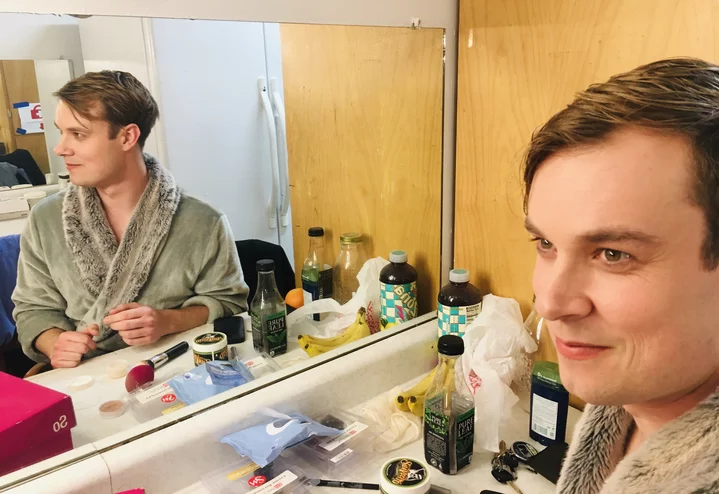
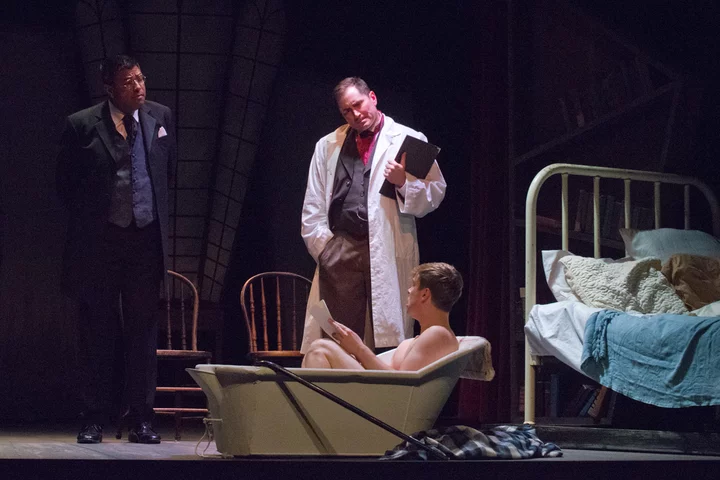
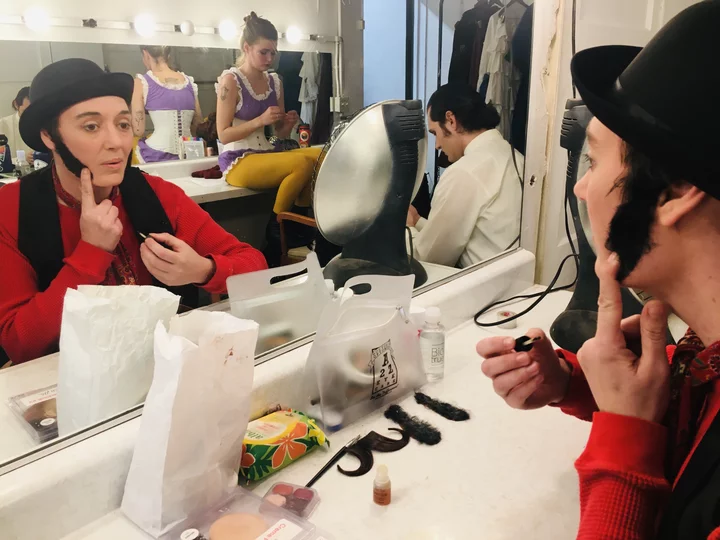
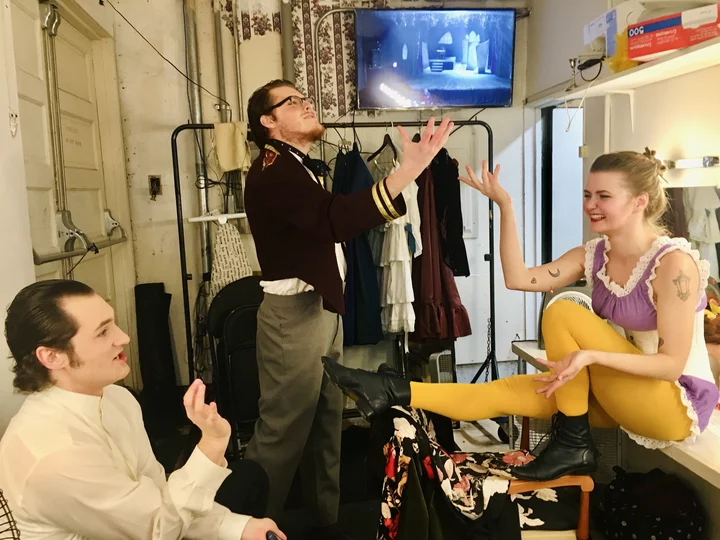
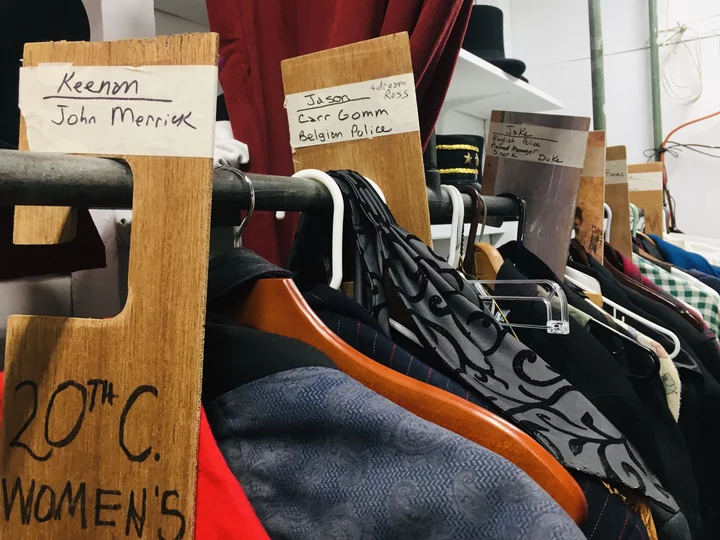
CLICK TO MANAGE